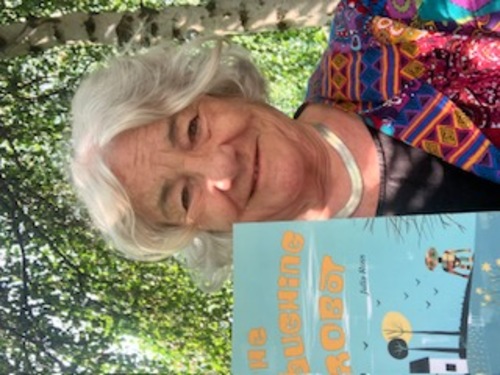“Are Robots Taking Over?” Social Care Leader Julia Ross Brings Provocative Novel About AI, Aging, and What Happens When Your Carer Isn’t Human, to Isle of Wight Literary Festival 2025
What if the person—or thing—looking after you in your old age isn’t human at all? It’s a question that’s moved from science fiction to today’s headlines, and it’s exactly what Julia Ross explores in The Laughing Robot, her gripping novel about a disillusioned social worker named Anna who escapes to the Isle of Wight only to find herself caught up in a controversial government experiment using AI robots to care for the elderly.
Ross, Chair of the British Association of Social Workers UK, will discuss the novel at the Isle of Wight Literary Festival 2025—and the timing couldn’t be more relevant. “People worry about the future, especially how robots will work in health and social care,” says Ross. “They’re nervous, frightened even. Older people and families are also very worried about who is going to look after them when they get older.”
Their fears aren’t unfounded. Real-world developments in 2025 mirror Ross’s fictional “carebots” with startling accuracy. MIT just unveiled E-BAR, a robot designed to catch elderly people when they fall. South Korea has distributed over 12,000 AI companions to isolated seniors who treat them like grandchildren. China’s elderly-care robot market hit $4 billion last year and continues to explode. Meanwhile, teenagers are turning to AI chatbots for therapy and adults are asking ChatGPT for emotional advice—what Ross calls “artificial empathy.”
“The growing relationship between humans and robots fascinates me endlessly,” she says. But The Laughing Robot isn’t a tech manual—it’s a page-turner. When Anna’s robot Henry2 saves her from a sinister end-of-life pathway called the “Right Way” (inspired by the real Liverpool Care Pathway scandal), they make a dramatic escape that will keep readers hooked until the final page.
The novel tackles serious issues—ageism, autonomy, dignity in dying, ECT in older women—but with dark humour and warmth that makes it compulsively readable. “I hope they will love the story first,” says Ross, “and then I hope they will think about how we learn to live with the new world of technology and robots. If we don’t, we’ll get left behind or even worse, tech or the people who create it will take advantage of us.”
Drawing on her decades as a nurse, social worker, and Director of Social Services, plus her work in AI and predictive analytics, Ross brings insider authenticity to every page. “Anna is my alter-ego,” she admits. “She goes where no-one else I know would go.”
The Isle of Wight setting isn’t accidental. With very high numbers of retirees and more arriving constantly, the island faces real challenges. “Islands are escapism,” says Ross, “but also a wonderful place to imagine the unimaginable.” In her novel, the island becomes “Home Farm”—a chilling vision of a care facility run entirely by robots.
Ross challenges our assumptions head-on: “Some people would much prefer to be looked after by an anonymous friendly machine than have four different strangers coming in a day to do intimate things to them.” It’s an uncomfortable truth many won’t admit. With care worker shortages reaching crisis levels and the Louise Casey Review of Social Care expected imminently, these questions demand answers now.
Meeting readers is “the best thing ever,” says Ross, though she confesses it can be “a bit daunting and even scary, especially when they are experts.” But mostly people love hearing about social work and “are becoming fascinated with artificial intelligence and robots—and I don’t blame them!”
The Laughing Robot offers a compelling exploration of what our future might hold—and what we might be willing to trade for safety, comfort, and the promise that someone (or something) will care for us when we need it most.
Julia Ross will discuss The Laughing Robot at the Isle of Wight Literary Festival 2025 on Saturday 11 October as part of the Local Authors’ Marketplace from 10:00 to 14:00. The novel is published by Arena Books (Paperback ISBN: 978-1-914390-33-3).
Press Contact:
Isabel Corfe
info@arenabooks.co.uk
01284 658979
www.arenabooks.co.uk
